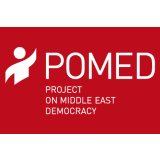Founded in 2006, the Project on Middle East Democracy (POMED) is a non-profit, non-partisan organization based in Washington, D.C. dedicated to examining how genuine democracies can develop in the Middle East and how the United States can best support that process. Through dialogue, research, and advocacy, POMED works to strengthen the constituency for U.S. policies that peacefully support democratic reform in the Middle East.
POMED believes that democratic reform in the Middle East should be viewed not merely as a goal aligned with American values and human rights, but also as an important strategic priority. U.S. interests are best served by a strong relationship with the people of the Middle East, and that requires a basic recognition of their legitimate aspirations for democratic rights.
As the Middle East undergoes an unprecedented transformation sparked by uprisings in Tunisia, Egypt, Libya, Yemen, and Bahrain there is a compelling need to rigorously examine how the U.S. can best support democratic transitions. This involves fostering constructive dialogue among academics and activists, policymakers and practitioners, and Americans and Middle Easterners; identifying the parameters of legitimate, effective support for democracy; and empowering the diverse coalition of actors who support policies consistent with those principles.
Programs:
Through Research, Dialogue, Advocacy, and Civil Society Partnerships, they work to strengthen support for genuine democratic development in the Middle East and North Africa.
- > Research: They support innovative research driven by rigorous analysis and actionable policy options in a wide array of publications. Their mission is to educate and inform policy makers and the public on how genuine democracies can develop in the Middle East, and how the U.S. can best support that process.
- > Dialogue: They foster dialogue between and among Americans and Middle Easterners by conducting panel discussions, working groups, and roundtables in Washington and elsewhere that bring together local and regional experts, as well as organizing conferences in the Middle East on political reform and U.S. policy.
- > Advocacy: They promote a consistent and credible pro-democracy foreign policy toward the Middle East through government relations, leveraging relationships with policymakers on Capitol Hill and in the executive branch. The advocacy program also works with a broad coalition of activists and advocates in Washington and the Middle East to highlight key issues and empower those who share a commitment to supporting democracy and human rights in the region.
- > Civil Society Partnerships: They collaborate with NGOs in the region to build their capacity and increase the impact of regional think tanks and advocacy organizations. In a healthy democracy, advocacy organizations and think tanks serve as critical links between government and engaged citizens. Building off its own experiences, POMED guides and mentors its partners in producing policy analysis and developing policy recommendations for their national policymakers, mirroring the role played by POMED in Washington.

